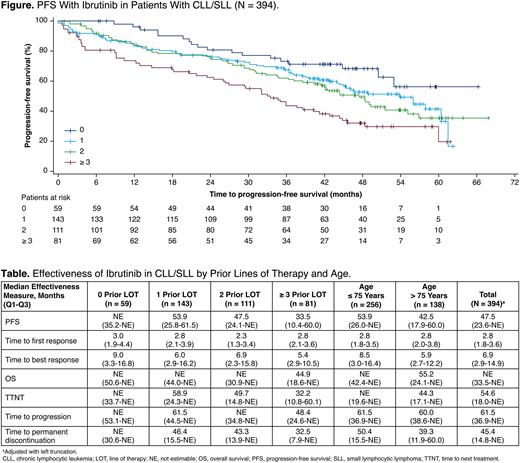Abstract
Background: FIRE is a noninterventional, multicenter, observational study of patients with a confirmed diagnosis of chronic lymphocytic leukemia (CLL)/small lymphocytic lymphoma (SLL) treated with ibrutinib in France.
Aim: The aim of the study is to collect real-world data to describe ibrutinib treatment patterns and assess its effectiveness and safety in CLL/SLL.
Methods: This retrospective (ret) and prospective (pro) study started on May 12, 2016, and is planned to complete after ~6 years. Eligible patients were ≥ 18 years, with a confirmed diagnosis of CLL/SLL, and who initiated ibrutinib therapy on or after November 21, 2014, (date of ibrutinib commercialization) either in previously untreated patients with del17p and/or TP53 mutation, or in patients with relapsed or refractory disease R/R.
Pro patients initiated ibrutinib treatment within 30 days of study start. Ret patients initiated ibrutinib treatment more than 30 days before inclusion in the study. Primary outcome measure was progression-free survival (PFS); secondary outcome measures included overall response rate (ORR), overall survival (OS), time to next treatment (TTNT), and safety. Ret-collected adverse events (AEs) included only those considered related to ibrutinib, whereas pro-collected AEs included all treatment-emergent AEs (TEAEs). Therefore, AEs are reported separately for each cohort. Total population effectiveness results were adjusted with left truncation. Patients were treated according to usual local clinical practice.
Results: We report results from the third interim analysis for patients with previously untreated and R/R CLL/SLL, with a median follow-up of 47.2 months, and with a focus on subgroup analysis. The effectiveness and safety populations comprised 394 patients (pro, n = 200; ret, n = 194) and 400 patients (pro, n = 202; ret, n = 198), respectively. Median age at ibrutinib initiation was 72 years (range, 39.0-93.0); 66.2% were male; median time from diagnosis to ibrutinib initiation was 7 years (range, 0.0-35.0). Patients received 0 (15.0%), 1 (36.3%), 2 (28.2%), or ≥ 3 (20.6%) prior lines of therapy (LOT). At baseline, complete response (CR; 50.0%) or partial response (PR; 36.2%) were recorded with the last prior therapy. Most patients (87.4%) progressed following last prior therapy, and median time from progression to initiation of ibrutinib was 2.1 months (range, 0.0-100.1). Of reported patients (n = 399), massive or symptomatic lymphadenopathy and/or splenomegaly was the most common reason (42.6%) for initiating ibrutinib treatment. Median PFS was 47.5 months (48.5/51.6 months in pro/ret). LOT and age (≤ 75 vs > 75 years) were statistically significant predictive factors for PFS. In patients with 0, 1, 2, and ≥ 3 prior LOT, median PFS was: not estimable (NE), 53.9 months, 47.5 months, and 33.5 months, respectively (Figure). At 48 months’ follow-up, ORR was 91.4%. Median TTNT was 54.6 months (NE/54.8 months in pro/ret). Median OS was NE overall and in pro/ret cohorts. Main effectiveness outcomes according to prior LOT and age are presented in the Table. Serious TEAEs related to ibrutinib were reported in 25.8% and 28.2/23.2% in pro/ret cohorts, respectively. AEs led to dose interruption (37.6/29.8%), withdrawal (30.2/22.7%), or reduction (26.7/11.1%) in the pro/ret cohorts. TEAEs of interest in the pro/ret cohorts were infection (68.8/57.1%), diarrhea (27.2/15.7%), arthralgia/myalgia (25.2/13.1%), arrhythmia (15.8/13.6% [including atrial fibrillation {9.4%/7.1%}]), hypertension (14.9/14.6%), rash (10.4/8.1%), and major bleeding (7.9/1.5%). Ibrutinib was permanently discontinued in 234 patients (58.5%); reported reasons (n = 212) were mostly due to AEs (36.8%) and disease progression (31.1%).
Conclusions: In this longer follow-up of the real-world FIRE study reflecting clinical practice in France, ibrutinib was shown to be an effective treatment for patients with CLL/SLL, and patients who received ibrutinib in earlier LOT achieved better PFS. The effectiveness and adverse event profiles are consistent with observations from clinical trials.
Disclosures
Dartigeas:Abbvie, Roche, Janssen, Beigene, AstraZeneca: Membership on an entity's Board of Directors or advisory committees; Janssen, Abbvie, Roche, AstraZeneca: Other: Travel Grant. Ysebaert:Abbvie, Astra-Zeneca, Janssen, Roche, Beigene, BMS/Celgene: Membership on an entity's Board of Directors or advisory committees, Research Funding. Feugier:AstraZeneca, Janssen, Abbvie, Beigene, Gilead: Membership on an entity's Board of Directors or advisory committees, Other: Congress Invitations. Delmer:Takeda: Honoraria; Novartis: Honoraria; AstraZeneca: Honoraria, Membership on an entity's Board of Directors or advisory committees, Other: Travel Support; Abbvie: Honoraria; Janssen: Honoraria, Membership on an entity's Board of Directors or advisory committees, Other: Travel Support. Dupuis:Janssen: Current Employment. Deslandes:Janssen: Current Employment. Lahaye:Janssen: Current Employment, Other: Current Employee with restricted stocks. Leblond:Abbvie: Membership on an entity's Board of Directors or advisory committees, Speakers Bureau; Janssen: Consultancy, Speakers Bureau; Beigene: Consultancy, Membership on an entity's Board of Directors or advisory committees, Speakers Bureau; MSD: Membership on an entity's Board of Directors or advisory committees, Speakers Bureau; Roche: Membership on an entity's Board of Directors or advisory committees; Amgen: Speakers Bureau; Lilly: Consultancy; AstraZeneca: Consultancy, Membership on an entity's Board of Directors or advisory committees, Speakers Bureau.
Author notes
Asterisk with author names denotes non-ASH members.


This feature is available to Subscribers Only
Sign In or Create an Account Close Modal